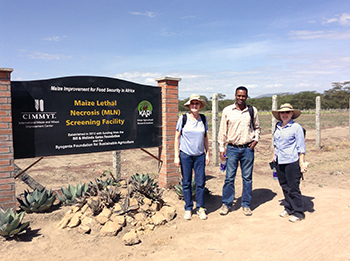Latest News Archive
Please select Category, Year, and then Month to display items
24 September 2024
|
Story Aimée Barlow
|
Photo Supplied
 Louzanne Coetzee, who made history by clinching South Africa’s second medal at the Paralympics, earning a bronze in the T11 1 500 m women’s final with a personal best time, received a warm reception when she recently returned home.
Louzanne Coetzee, who made history by clinching South Africa’s second medal at the Paralympics, earning a bronze in the T11 1 500 m women’s final with a personal best time, received a warm reception when she recently returned home.
The celebrated Paralympic bronze medallist Louzanne Coetzee returned home to a warm welcome at the Bram Fischer International Airport on 10 September 2024.
Family, friends, colleagues, Arista students, and media gathered to celebrate her remarkable achievement and show their support.
Coetzee – KovsieSport Coordinator of Parasport at the University of the Free State (UFS) – made history by clinching South Africa’s second medal at the Paralympics, earning a bronze in the T11 1 500 m women’s final with a personal best time. Her dedication and hard work have not only brought her personal glory but have also inspired many in her community.
Among those present to welcome her was Jerry Laka, Director of KovsieSport, who expressed his pride in Coetzee’s accomplishments.
"We as KovsieSport are so proud of our colleague Coetzee. It is amazing to see a product of KovsieSport achieving greatness on the world stage. She is truly an inspiration to us all," said Laka.
“I am so glad to be back, and to have Laka and my colleagues here. It means the world to me. Having Laka here shows his commitment to my career and ParaSport and his staff in general,” shared Coetzee, her gratitude evident.
She further expressed her appreciation for the support she received, stating, “I don’t have the words to describe how thankful I am for the support from the UFS community.”
Coetzee’s return is a proud moment for South Africa and the University of the Free State (UFS) community. Welcome home, Louzanne! Your achievements have made us all proud!
Maize breeder rewarded for his research to enhance food security in Africa
2016-08-26

Prof Maryke Labuschagne from the UFS Department
of Plant Sciences, Berhanu Tadesse Ertiro, a
postgraduate student in Plant breeding at the UFS,
and Dr Peg Redinbaugh of the US Department of
Agriculture in Wooster, Ohio.
Photo: Supplied
Ethiopia is one of the African countries, deeply affected by food insecurity. Berhanu Tadesse Ertiro, a citizen from Ethiopia started his career - after graduating with his undergraduate degree in 2003 - as a junior maize breeder. Today he is pursuing his doctorate degree in Plant Breeding at the University of the Free State (UFS).
His research had made some great strides in contributing to food security in Africa. He recently received a fellowship from the prestigious Norman E. Borlaug Leadership Enhancement in Agriculture Program (Borlaug LEAP).
This fellowship is only awarded to students whose research has relevance to the national development of the student’s home country or region. The aim of these fellowships are to enhance the quality of thesis research of graduate students from developing countries who show strong promise as leaders in the field of agriculture and related disciplines.
Low soil fertility a major maize production constraint
Berhanu is also a visiting student at the International Maize and Wheat Improvement Center (CIMMYT) in Kenya, where he is running field experiments for his PhD thesis dissertation. His research focuses on Nitrogen Use Efficiency (NUE) and Maize Lethal Necrosis (MLN) disease tolerance. Low soil fertility and MLN are among the major maize production constraints in eastern and southern Africa, where maize is staple food.
Such hybrids have the potential to contribute greatly
towards food security among farmers and their
families through increased productivity.
The use of new tools could increase breeding efficiency and reduce the time needed for the release of new stress tolerant hybrids. Such hybrids have the potential to contribute greatly towards food security among farmers and their families through increased productivity. Berhanu is looking at the feasibility of genome wide selection for improvement of NUE in tropical maize.
Fellowship includes mentorship and supervision across borders
The programme supports engaging a mentor at a United States university and Consortium of International Agricultural Research Centers (CGIAR). During his fellowship, he will be supervised and mentored by Prof Maryke Labuschagne of the UFS, Prof Rex Bernando, a professor of Corn Breeding and Genetics at the University of Minnesota and Dr Biswanath Das of CIMMYT, Kenya.
As a LEAP fellow, Berhanu was invited to attend the 30th Annual World Food Prize events to take place in October 2016, in Des Moines, Iowa. The week will include his attendance at the Board for International Food and Agricultural Development meeting, participation at side-events at the Borlaug Dialogue International Symposium and the World Food Prize.